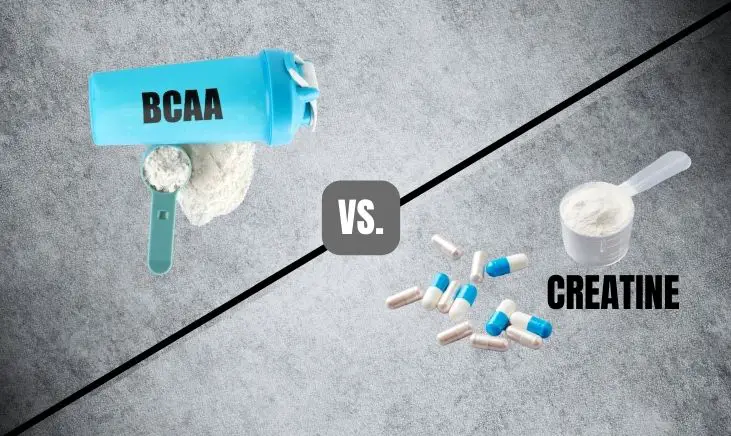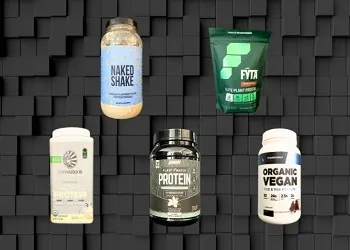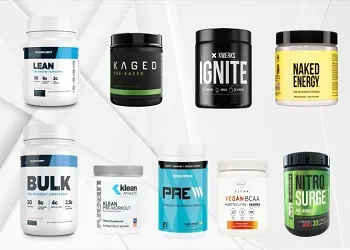Navigating the supplement market can be incredibly difficult and overwhelming. Between balancing your workout schedules and the rest of your busy life, you already have enough on your plate!
We created this blog post to provide an overview of two hot supplements—creatine and branched-chain amino acids (BCAAs)—to help you determine which product, or combination of products, is right for you and your training goals.
Table of Contents
What is Creatine?
I’m sure you’ve heard of creatine supplements countless times by now, as it’s one of the most well-studied and popular ergonomic supplements for athletic performance.
It comes in a variety of forms, but a creatine monohydrate powder is the most common. Creatine is an organic compound, found mostly in our muscles, that plays an important role in energy production, hence its importance in athletic performance.

How It Works
The majority of the creatine in our body is found in our skeletal muscles as phosphocreatine. When we engage in any type of activity, our body uses adenosine triphosphate (ATP) to activate our muscles. As ATP decreases throughout the activity, we need to synthesize more. This is where phosphocreatine comes in. Phosphocreatine combines with the compound ADP to create more ATP. It is through this generation of ATP that creatine aids in high-intensity training regimens, endurance, and power.
Sources of Creatine
Just like humans, animals also contain creatine in their bodies naturally, so we can get creatine through our diet by consuming animal proteins such as:
- Red meat
- Seafood
- Animal milk
Creatine Production in the Human Body
Our bodies also naturally produce creatine in our liver, kidneys, and pancreas from the amino acids arginine, glycine, and methionine. Our bodies make about 1 g/day of creatine each day.

What are BCAAs?
Branched-chain amino acids, or BCAAs, are a group of three amino acids—leucine, isoleucine, and valine.
Amino acids are the small building blocks that create proteins, which then combine to form muscles. There are a total of twenty amino acids that all play key roles in protein synthesis. However, nine of these twenty are called essential amino acids (EAAs), meaning it is essential that we consume them through our diet.
Leucine, isoleucine, and valine are three of the nine EAAs, and we call them branched-chain amino acids because their structures resemble branches. These BCAAs have unique roles in skeletal muscle protein metabolism which is one reason why they are a popular supplement to support muscle gains.
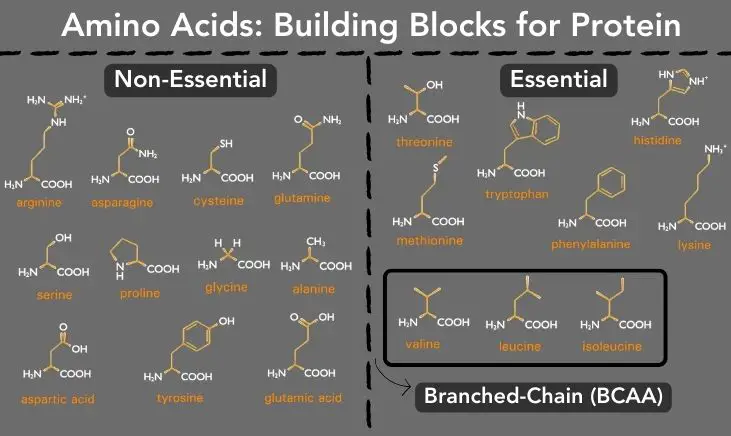
How It Works
The research surrounding BCAAs and their role in muscle development and athletic performance is not as vast as that for supplements like creatine. What we do know is that these three EAAs are processed differently than the others. They bypass the liver and travel straight to the muscle where they synthesize 35% of our muscle tissues! Leucine is especially interesting for its role in turning on the signal to start protein synthesis.
Sources of BCAAs
Since amino acids are the building block of proteins, we can get BCAAs in our diet through … you’ve guessed it—high-protein foods. Unlike creatine, BCAAs are found in both plant and animal protein sources, including:
- Meat
- Fish
- Eggs
- Animal milk
- Beans
- Legumes
- Soy proteins

Why are BCAAs Called Essential Amino Acids?
Of the twenty amino acids, eleven can be made by our body, whereas the nine EAAs cannot. For our body to have all of the necessary materials to build proteins and muscles, we must consume these nine from food or supplements.
Muscle Protein Synthesis: How it Works
Now let’s summarize creatine vs amino acids in terms of muscle protein synthesis, and then we’ll take a closer look at the research behind these specific supplements as they relate to your training goals.
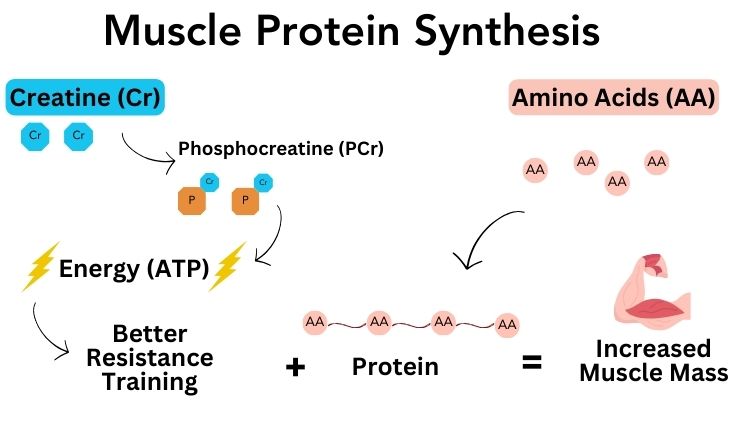
BCAAs vs Creatine: The Differences
When choosing which supplements to take, it’s important to keep your individual goals in mind. Let’s take a closer look at the different mechanisms and outcomes of using BCAAs vs creatine.
Athletic Performance

Creatine
As we use the phosphocreatine in our muscles during a workout, our ability to quickly regenerate ATP for energy decreases, making our muscles fatigued. Supplementing with creatine monohydrate will increase your baseline stores of phosphocreatine, meaning you can delay this fatigue longer and improve your performance. In a study with 56 men, the group taking a creatine supplement was able to complete 12.7% more bench press reps before reaching muscle fatigue, compared to the placebo group.
If you’re doing high-intensity aerobic exercise or sports requiring end sprints, you may want to take your creatine supplement with a carbohydrate-rich snack. This will amplify your ability to regenerate your glycogen stores, which will fuel you for those high-intensity moments and improve your overall performance.
BCAAs
Branched-chain amino acids are best known for their role in prolonging energy and decreasing fatigue. It has been shown that BCAAs facilitate a reduction in central fatigue, which helps with focus and increases overall performance in athletes.
This could be especially important for those participating in endurance activities to reduce fatigue over time and propel you through your training.
Increase Lean Muscle Mass

Creatine
While creatine isn’t directly involved in increasing muscle mass, it’s pretty safe to assume that if you don’t have the energy to train then you’re not going to see the gains. Since the combination of resistance training and creatine supplementation leads to increased overall performance in the gym, muscle growth will follow.
BCAAs
We’ve already discussed amino acids as the necessary building blocks for muscle protein synthesis. Supplementing with more of these building blocks ensures that your body has the resources it needs to increase your muscle mass.
You may be wondering if using a protein powder is similar to a BCAA supplement. Protein powders also provide these three EAAs along with the other seventeen, but the advantage of BCAA-specific supplements is that they contain fewer calories than something like whey protein.
Preventing Muscle Breakdown

Creatine
The research surrounding creatine’s role in preventing muscle damage is still limited and conflicting. What we do know is that there is an association between high levels of the enzyme, creatine kinase, and more muscle damage. Creatine kinase is lower when taking a creatine supplement. One study found that athletes supplementing creatine had less muscle damage during the 24, 48, 72, and 96 hours following exercise.
BCAAs
There have been studies where BCAA supplementation was associated with fewer markers of muscle damage, as well as inhibiting muscle breakdown post-exercise. We created a list of the best BCAA supplements based off of multiple ranking factors so you can take a look at what a quality supplement looks like.
Decrease Muscle Soreness/Post-Workout Recovery

Creatine
Among its many other roles, creatine helps to lower inflammation and oxidative stress in your muscles. This helps with your recovery between training sessions.
Something to keep in mind: if you’re able to increase your number of sets or overall weight due to the positive effects of creatine, this could lead to greater muscle soreness and recovery times in the end.
BCAAs
A recent meta-analysis identified that BCAA supplementation has resulted in participants reporting less muscle soreness after a workout, but the reason behind this is still not well understood and seems to be dependent on the type of exercise.
Should I Take BCAAs and Creatine Together?
Mixing BCAAs and Creatine
There’s no reason why you can’t take BCAAs and creatine together in terms of safety or side effects. If you’re trying to stimulate muscle growth or improve exercise performance and you can afford to add supplements into your routine, then taking creatine and BCAAs together will help you cover more bases.

Bottom Line on BCAAs vs Creatine
Still not sure if these supplements are right for you? Here’s the bottom line:
- If you’re looking for a well-studied, muscle-building supplement to enhance your performance during resistance training, try creatine.
- If you’re looking to optimize your regime with additional muscle-building supplements, try BCAAs.
FAQs
Which is better: BCAAs or creatine?
Since BCAAs and creatine have different functions in the body, one isn’t better than the other. However, as a supplement, creatine is currently better understood, and there is more research to back up its positive effects on muscle function, gains, and power.
Additionally, since the only food sources of creatine are animal proteins, people who follow a vegetarian or vegan diet and aren’t consuming creatine through their food may benefit from a creatine supplement.
What are some side effects of creatine?
Creatine can cause water retention, which can lead to weight gain. For this reason, creatine loading may not be recommended for weight-bearing endurance athletes.
What are the downsides of BCAAs?
Using BCAAs as an athletic performance supplement is relatively new, so the evidence is still unclear. For this reason, outcomes directly tied to taking BCAAs aren’t as guaranteed. There has also been some research to say that individuals consuming too many amino acid supplements may experience side effects such as stomach pain and upset.
Can I mix BCAAs and protein?
Yes, you can take BCAAs with another protein supplement. But keep in mind that your protein powder supplement should be a complete protein, meaning it contains all of the amino acids, including leucine, isoleucine, and valine (the 3 BCAAs).
References
Cleveland Clinic. (2023, April 26). Creatine. Cleveland Clinic. https://my.clevelandclinic.org/health/treatments/17674-creatine
Forbes, S. C., Candow, D. G., Joao, Kennedy, M. D., Forbes, J. L., Machado, M., Bustillo, E., Gomez-Lopez, J., Zapata, A., & Antonio, J. (2023). Creatine supplementation and endurance performance: surges and sprints to win the race. Journal of the International Society of Sports Nutrition, 20(1). https://doi.org/10.1080/15502783.2023.2204071
Kaufman, M. W., Roche, M., & Fredericson, M. (2022). The Impact of Supplements on Sports Performance for the Trained Athlete: A Critical Analysis. Current Sports Medicine Reports, 21(7), 232–238. https://doi.org/10.1249/JSR.0000000000000972
Kaviani, M., Shaw, K., & Chilibeck, P. D. (2020). Benefits of Creatine Supplementation for Vegetarians Compared to Omnivorous Athletes: A Systematic Review. International Journal of Environmental Research and Public Health, 17(9), 3041. https://doi.org/10.3390/ijerph17093041
Khemtong, C., Kuo, C.-H., Chen, C.-Y., Jaime, S. J., & Condello, G. (2021). Does Branched-Chain Amino Acids (BCAAs) Supplementation Attenuate Muscle Damage Markers and Soreness after Resistance Exercise in Trained Males? A Meta-Analysis of Randomized Controlled Trials. Nutrients, 13(6), 1880. https://doi.org/10.3390/nu13061880
Marcon, M., & Zanella, P. B. (2022). The effect of branched-chain amino acids supplementation in physical exercise: A systematic review of human randomized controlled trials. Science & Sports, 37(5-6). https://doi.org/10.1016/j.scispo.2021.05.006
Martinho, D. V., Nobari, H., Faria, A., Field, A., Duarte, D., & Sarmento, H. (2022). Oral Branched-Chain Amino Acids Supplementation in Athletes: A Systematic Review. Nutrients, 14(19), 4002. https://doi.org/10.3390/nu14194002
Stuart, A. (2013, January 7). Branched-Chain Amino Acids. WebMD; WebMD. https://www.webmd.com/vitamins-and-supplements/branched-chain-amino-acids-uses-risks
